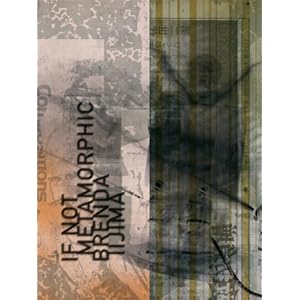 Nothing Is In HereAndrew Levy
EOAGH Press, 2011
Nothing Is In HereAndrew Levy
EOAGH Press, 2011
"The United States of Andrew Levy"
review by Matt Reeck
×
Constitution.
Both meanings of the word lead the way into Andrew Levy’s book. Nothing Is In Here is a constitution, in the sense of a document of profession, belief, and order—a binding to law, a cohering of a social body, as any nation-state must have. But it also investigates the idea of constitution as composition, as the content of being.
The title sentence “nothing is in here” is a primary tenet in this new state, the United States of Andrew Levy, and yet with its seeming negation of the book’s every proposition, what gives, Mr. President? Am I not to take you seriously?
Well, no. Or yes.
Every book of poetry constitutes at least one thing: a proposition about authentic experience, a proposition about authentic statement, or a proposition about both. Nothing Is In Here does both. As a polysemous text, it asks the reader to focus on their experience of reading; it asks the reader to reconstitute the text in a way meaningful for themselves. The book also asks the reader to be wary of language’s advantage: its ability to propose reality, to instate reality through its logic. (Logic is a feature of language.) This warning, then, is Levy’s own way of defining, or deferring, the possible authenticity of statement, language and voice. The question is shifted to the sphere of social reality, i.e. experience.
If nothing is in here, what does Nothing Is In Here point toward?
It points toward a Utopian search for an authentic experience of life and of language, not blinded by the beacons of convention—ideology and orthodoxy. It doesn’t tell us any one thing, but it does show us what an experience of looking for authentic experience (as a poet, as a citizen) looks like. It also shows the process of a writer trying to keep himself off-balance so as to subvert his own ideological routines.
But if the value of statement is that it leads quickly to action, what happens to the possibility of action within a failed public order and corrupt government—in our America? The possibility of meaningful action seems remote. Instead, in such conditions, the only realizable goal becomes imagining future actions, and likewise opening the future to imagination.
Nothing Is In Here speaks with the urgency of finding an anchor in social experience that will allow individual and social transformation.
×
Polysemous Texts.
Every text is plural, or polysemous. Of course a writer can find ways to reduce or to exaggerate the open-ended nature of texts, especially literary ones. Those that constrain meaning, or reduce a text’s polysemous nature, are, as Roland Barthes instructed in S/Z, readerly. Those that promote the fragmentation of narrative and encourage diverse readings are writerly.
Mark Nothing Is In Here as an extreme example of the latter.
Barthes writes that a writerly text means to “make the reader no longer a consumer, but a producer of the text” (4). It wants the reader to “gain[ing] access to the magic of the signifier, to the pleasure of writing.” This is a cordial invitation: the reader as equal to the writer. It is an invitation that Levy offers as well: “I don’t think you’ll be able to read my writing without leaving some trace” (46). This is good. Not only does this statement recognize textual reality, but it also permits my desire to participate in shaping meaning.
But Barthes cautions that the writerly text is an abstraction, an ideal image that cannot live fully in the world:
The writerly text is a perpetual present, upon which no consequent language (which would inevitably make it past) can be superimposed; the writerly text is ourselves writing, before the infinite play of the world (the world as function) is traversed, intersected, stopped, plasticized by some singular system (Ideology, Genus, Criticism) which reduces the plurality of entrances, the opening of networks, the infinity of languages. (5)
Nothing Is In Here is, thus, not without content. It has its own constitution. And it has its own ideology (Utopian) and genus/genre (poetic manifesto). If the title suggests that the book is writerly, then Barthes keeps us grounded by pointing out the obvious constraints on writing. No text is entirely random; once writing begins, the writer’s consciousness shapes it in ways well beyond the writer’s control:
For the plural text, there cannot be a narrative structure, a grammar, or a logic; thus, if one or another of these are sometimes permitted to come forward, it is in proportion (giving this expression its full quantitative value) as we are dealing with incompletely plural texts, texts whose plural is more or less parsimonious. (6)
Nevertheless, Levy’s text struggles to achieve a fluid interchange between the constitutive elements of language and consciousness. It pushes against the forces that bind us into narrative, coherent (and, perhaps, sane) bodies. In this way, it is experimental; in this way, it is Utopian.
×
Utopia.
After the failed Utopian schemes of the twentieth century, it’s hard to get too excited about future Utopias. Read Foucault for a thoroughly distasteful description of Utopia:
The plague-stricken town, traversed throughout with hierarchy, surveillance, observation, writing; the town immobilized by the functioning of an extensive power that bears a distinct way over all individual bodies—this is the utopia of the perfectly governed city. (198)
This is the sort of nation-state Levy does not want to live in. Nor would I. But it is, in certain regards, reminiscent of our lives today: hierarchy, surveillance, the function of an extensive power (viz. money, social classism) over individual bodies.
If we live in a decadent state, if we recognize the earmarks of corruption around us, then we also suffer the chronic fatigue of hindsight. This is Levy’s world.
He laments the ambiguous freedom of language stripped from social context: “It has been easy to say anything at all for some time” (1). He questions the bureaucracies of intellectual creed and caste: “It’s not even disinterestedness, its exhaustion / What’s the problem? / Languages have betrayed their glorious beginnings? / Intellectual, social, and professional suspension?” (52).
He returns to interrogative reminders, asking us to overcome our torpor: “So what do we do?” (13). And, “Would we get used to it? Would we accommodate ourselves? / […] Be content with what you have been able to act on?” (38). He pushes us toward acknowledging our inactivity and our resignation within the status quo. And yet, what change is possible? What revolutionary change can we countenance, with the recent past being so full of Utopian errors?
In Archaeologies of the Future: The Desire Called Utopia and Other Science Fictions, Jameson suggests that within the contemporary world the impulse toward change itself, the Utopian desire for transformation itself, suffices:
The Utopian form itself is the answer to the universal ideological conviction that no alternative is possible, that there is no alternative to the system. But it asserts this by forcing us to think about the break itself, and not by offering a more traditional picture of what things would be like after the break. (232)
This is the leading edge, the onward search, that Levy is interested in. He locates the break in two things: the text, or the book as form; and beauty. First, the text itself hopes to furnish possibilities: “To act so that thought could possibly be read in ways different than one expected” (5/6).
Beauty is the key to understanding what might lead us toward a future of shared value: “[…] beauty focuses on inclusion, finding commonalities between objectives” (70).
×
Beauty.
[1] Important here is the idea of social text—of a text not speaking merely for a private individual but a text that does that and goes beyond that to speak with a social voice, for social imperatives, effectual because the desires it expresses aren’t that of just one individual but rather represent the beliefs of many.
The text’s non-referential use of personal pronouns is the first obvious means of implying a social text. The text reinforces this through its meta-commentary: “Identity can be lost in the telling of the stories one knows or linking sentences in imagined collisions as if these colliding stories are not there” (70). The writer can hardly be located in the weave of the text’s pronouns and in the displacements of scene and attitude. But the goal is not to locate a particular individual—the writer—through the veil of the text’s words. The goal is to progress toward a consciousness capable of transformation.
[2] Beauty as abstraction, as motivator, as means, as Utopian ideal.
Beauty is Levy’s idea to shape action. It’s intimately tied to the idea of the book:
There’s something in my character that’s always pushed me toward the book. At the idea that I would discover, if my intentions and effort were spirited, the book that would satisfy a quest for everything I’d grown to imagine language, as rendered in books might provide. It would be a complete satisfaction, emotionally, sexually, intellectually, in every way. I would end my search for that book having come to the one that completed everything. And if it did “complete” everything for me it would by extension, though I’ve never bothered to think how this extension would manifest itself, complete every person’s thirst in the entire world. That has been part of my fantasy of beauty—of what beauty would be. (7-8)
This passage, the first in the book to deal with beauty overtly, declares the scope of beauty’s power. The writing is full of the language of Utopia: discovery, completion, total satisfaction. But it reins itself in at the end; it acknowledges what Jameson notes as necessary in our times—the understanding that Utopia is a fantasy, an imagining of what something could be without going so far as defining it outright.
If Utopia, if beauty, is not (and should not be) an end-state, then it might act as a vehicle to transform us out of stasis: “The beauty of something you can’t do even if the attempt toward that thing, thoroughly compromised, is penned to dissolve or recede from your hopelessly outdated history” (11). That is to say, beauty is a motivator toward something, and though that thing will never exist, the momentum will create a new landscape, a new history, and might create a new sense of possibility.
[3] Beauty quotes.
Beauty is the philosopher’s stone (that which can change metal to gold, human ambivalence to positive action). Beauty is the lynchpin to “[s]elf-transmuting in the reform of one’s own discourse” (70).
No eventuality, the text says, “[…] fails to diminish the belief in the inevitability of a beauty that can be attained” (16).
The text itself is a conduit for change: “What is beautiful must change. […] The unthinkably improbable hero of the plot, given so much time, makes the impossible become possible, the possible beautiful, and a good competitor emotionally” (23).
Beauty has been maligned: “Beauty isn’t a bed partner to envy, but it has been forced to act as one” (32).
Instead, we should acknowledge it as a shining hope: “There is a circle that goes from you to the world and back. That’s the way to go into a world. A thick beauty” (60).
Beauty is the key to linking the individual to the commonweal:
Beauty may first appear “an unblendable element … alien and unassimilable,” a desire that when you open it up it becomes a piece of the real you can live in. I disappear when I feel it and everything, every bit of everything rises before me. I am part of the bridge that is falling; I am part of the bridge that is being built. I imagine everything is still very rough going. I understand that it must be difficult to think. That incompletion in the imagined manifestation of the complete has been a crucial part of my fantasy of beauty—of what beauty would be. The site of many celebrations, in some manner self-arranged, it’s something that seems to be, at least for me, a required course of hope temporarily turned out and felt to be complete. (61)
×
Postscript.
If a repetitive refrain (as refrains tend to be), “nothing is in here” asks us even at the book’s conclusion not to accept it. Not to accept this text. This answer. Nothing Is In Here asks us not simply to shelve the book, nod or shake our heads, yawn or smile. Rather, it really wants us to ask ourselves what we can do to change the real world we live in. This is a generous offer. It’s also an offer, and challenge, that this reader will continue to try to meet.
×
Works Cited.
Barthes, Roland. S/Z. Trans. Richard Miller. NY: FSG, 1974.
Foucault, Michel. Discipline and Punish. Trans. Alan Sheridan. NY: Vintage, 1995.
Jameson, Fredric. Archaeologies of the Future: The Desire Called Utopia and Other Science Fictions. London: Verso, 2005.
---
Andrew Levy is the author of Don’t Forget to Breathe (Chax Press), Nothing Is In Here (EOAGH Books), Cracking Up (Truck Books), The Big Melt (Factory School), Ashoka (Zasterle Books), Democracy Assemblages (Innerer Klang), Values Chauffeur You (O Books), and several other titles of poetry and prose. His writing has appeared in numerous journals and anthologies including Writing from the New Coast, The Gertrude Stein Awards in Innovative American Poetry, and Telling It Slant: Avant-Garde Poetics of the 1990s. With Roberto Harrison, Andrew edited and published the poetry journal Crayon 1997-2008.
Matt Reeck’s poetry is forthcoming in Colorado Review, Interim, No Dear, and Verse. His reviews have appeared in Jacket2 and The Brooklyn Rail. A winner of PEN and NEA translation grants, he is the co-translator with Aftab Ahmad of Bombay Stories – stories from the Urdu of Saadat Hasan Manto – forthcoming from Random House India. He is the co-editor of the new magazine Staging Ground.

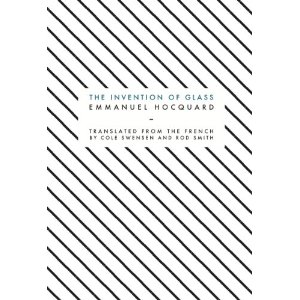 Canarium Press, 2012
Canarium Press, 2012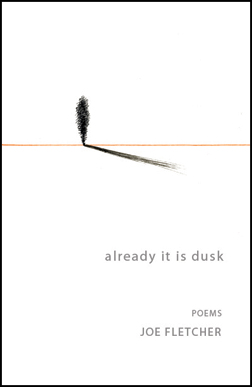

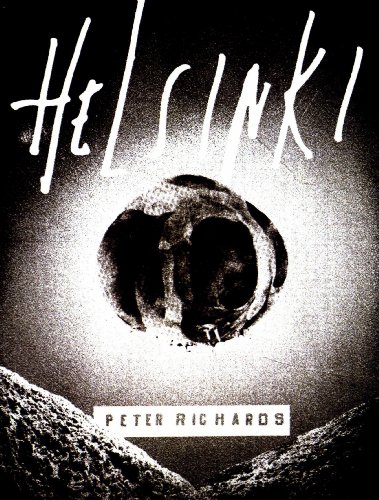
 pure lilac, and the figure is more lump than human. Also, the central figure is in repose. In the two side panels, the puddle is a mix of lilac and the color of skin. The side figures sit in a chair, though sections of torso are absent. Instead, where the torso should be, there is the void of the threshold behind them.
pure lilac, and the figure is more lump than human. Also, the central figure is in repose. In the two side panels, the puddle is a mix of lilac and the color of skin. The side figures sit in a chair, though sections of torso are absent. Instead, where the torso should be, there is the void of the threshold behind them.
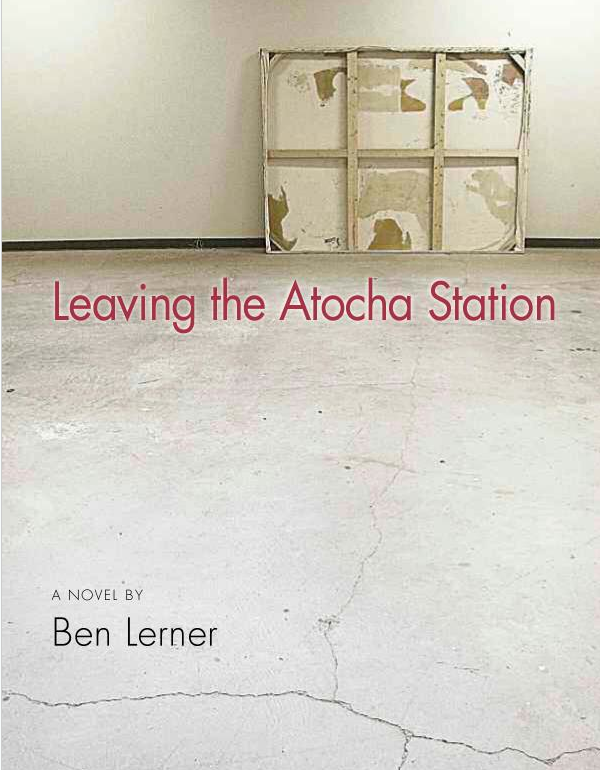
 Coffee House Press, 2010
Review by Noel Thistle Tague
Coffee House Press, 2010
Review by Noel Thistle Tague Julie Carr's previous books are 100 Notes on Violence, published by Ahsahta Press in 2009, Equivocal, published by Alice James Books in 2007, andMead: An Epithalamion, which won the University of Georgia Press's Contemporary Poetry Prize in 2004. Her poems have appeared widely in journals such as Volt, Verse, New American Writing, Parthenon West, Boston Review, Bombay Gin, Denver Quarterly, Colorado Review, American Letters and Commentary, and Public Space. She also has poems in the anthologies Not for Mothers Only (Fence Books), and The Best American Poetry 2007. She teaches poetry and literature at the University of Colorado, Boulder, and is the co-publisher, with Tim Roberts, of Counterpath Press.
---
Noel Thistle Tague was born in Ontario and was raised in the Thousand Islands region of northern New York. Currently, she is pursuing an MFA at the University of Montana where she also teaches composition.
Julie Carr's previous books are 100 Notes on Violence, published by Ahsahta Press in 2009, Equivocal, published by Alice James Books in 2007, andMead: An Epithalamion, which won the University of Georgia Press's Contemporary Poetry Prize in 2004. Her poems have appeared widely in journals such as Volt, Verse, New American Writing, Parthenon West, Boston Review, Bombay Gin, Denver Quarterly, Colorado Review, American Letters and Commentary, and Public Space. She also has poems in the anthologies Not for Mothers Only (Fence Books), and The Best American Poetry 2007. She teaches poetry and literature at the University of Colorado, Boulder, and is the co-publisher, with Tim Roberts, of Counterpath Press.
---
Noel Thistle Tague was born in Ontario and was raised in the Thousand Islands region of northern New York. Currently, she is pursuing an MFA at the University of Montana where she also teaches composition. Ugly Duckling Presse, 2010.
Reviewed by Ezekiel Black.
Ugly Duckling Presse, 2010.
Reviewed by Ezekiel Black.
 THALIA FIELD's books with New Directions also include Point and Line (2000) and Incarnate:Story Material (2004). She is the author of the novel, ULULU (Clown Shrapnel), published by Coffee House Press (2007), and with Abigail Lang, A Prank of Georges (Essay Press, 2010). Thalia teaches in the Literary Arts department of Brown University.
---
G.R.O.A.N. is a collaborative-action imprint currently based in the
Netherlands. They can be contacted at: groanpoetics@gmail.com.
THALIA FIELD's books with New Directions also include Point and Line (2000) and Incarnate:Story Material (2004). She is the author of the novel, ULULU (Clown Shrapnel), published by Coffee House Press (2007), and with Abigail Lang, A Prank of Georges (Essay Press, 2010). Thalia teaches in the Literary Arts department of Brown University.
---
G.R.O.A.N. is a collaborative-action imprint currently based in the
Netherlands. They can be contacted at: groanpoetics@gmail.com. BOA Editions Ltd,
1 April 2011, 92 pages
BOA Editions Ltd,
1 April 2011, 92 pages Rochester, NY: BOA Editions
Rochester, NY: BOA Editions Keetje Kuipers was born in Pullman, WA to a fishing guide and a sociologist. Since then, she's lived in Idaho, Montana, Minnesota, California, Pennsylvania, New York, and Oregon. Though she's pursued all manner of careers--from midnight baker to Google desk jockey, publisher's assistant to Off-Off-Broadway actress--poetry has been her passion for many years. Writing directly to the themes of loneliness, longing, and loss, Kuipers' first collection, Beautiful in the Mouth, contains, as The Rumpus put it, "pitch-perfect poems about topics that are expected in a poetry collection, but that are crafted so well that they transcend cliché to flower into these plainly beautiful chunks of text." Still obsessed with restlessness and isolation, Kuipers is currently at work on a manuscript entitled "The Keys to the Jail" which contains poems that examine the crimes we commit against ourselves--our acts of faithlessness, and the redemption of returning home to the self we left behind. As Kuipers herself has said, "[Poems] are beautiful, necessary attempts, the same way that standing on top of a mountain and shouting your name into the uninhabited air is an attempt—we must declare ourselves over and over again, and still never really find a way to understand how we exist."
Keetje Kuipers was born in Pullman, WA to a fishing guide and a sociologist. Since then, she's lived in Idaho, Montana, Minnesota, California, Pennsylvania, New York, and Oregon. Though she's pursued all manner of careers--from midnight baker to Google desk jockey, publisher's assistant to Off-Off-Broadway actress--poetry has been her passion for many years. Writing directly to the themes of loneliness, longing, and loss, Kuipers' first collection, Beautiful in the Mouth, contains, as The Rumpus put it, "pitch-perfect poems about topics that are expected in a poetry collection, but that are crafted so well that they transcend cliché to flower into these plainly beautiful chunks of text." Still obsessed with restlessness and isolation, Kuipers is currently at work on a manuscript entitled "The Keys to the Jail" which contains poems that examine the crimes we commit against ourselves--our acts of faithlessness, and the redemption of returning home to the self we left behind. As Kuipers herself has said, "[Poems] are beautiful, necessary attempts, the same way that standing on top of a mountain and shouting your name into the uninhabited air is an attempt—we must declare ourselves over and over again, and still never really find a way to understand how we exist." Mike Walker is a writer, journalist, and poet. His original research and other academic work has been published in: AirMed, Goldenseal, EcoFlorida, BrightLights Quarterly, the ATA Chronicle, Translation Journal, Multilingual Computing and Technology and other journals. His journalism in: The Florida Times-Union, The North Florida News Daily, Satellite Magazine, Twisted Ear, and other publications. His poetry in: Meanie, the Church Wellesley Review, Tipton Poetry Journal, and other publications. He lives in Gainesville, Florida.
Mike Walker is a writer, journalist, and poet. His original research and other academic work has been published in: AirMed, Goldenseal, EcoFlorida, BrightLights Quarterly, the ATA Chronicle, Translation Journal, Multilingual Computing and Technology and other journals. His journalism in: The Florida Times-Union, The North Florida News Daily, Satellite Magazine, Twisted Ear, and other publications. His poetry in: Meanie, the Church Wellesley Review, Tipton Poetry Journal, and other publications. He lives in Gainesville, Florida.
 Aaron Kunin grew up in Minneapolis, was educated at Brown, Johns Hopkins, and Duke. His work has appeared in Boston Review, Fence, The Germ, No: A Journal of The Arts, The Poetry Project Newsletter, The Poker, and elsewhere.
Aaron Kunin grew up in Minneapolis, was educated at Brown, Johns Hopkins, and Duke. His work has appeared in Boston Review, Fence, The Germ, No: A Journal of The Arts, The Poetry Project Newsletter, The Poker, and elsewhere.